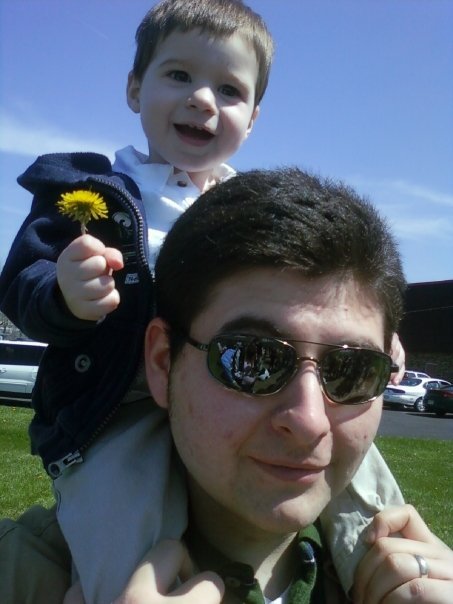Back when my son was about one and a half, my wife and I noticed him regressing in a lot of ways. We didn’t know what it was at first. We didn’t know why he would suddenly forget words, dislike foods he generally enjoyed or began having tantrums so beyond that of the norm that we had to take steps to keep him from hurting himself. After a number of doctors, assessments and a significant amount of worry, we finally heard the words, “I’m afraid your son has a form of Autism, Mr. and Mrs. Duarte”.

Dr. Jill delivered this seemingly innocuous statement in a matter-of-fact way that almost made me question why it just felt like a punch in the gut. After the initial shock settles, the fear, anger and despair of learning that your child isn’t “normal” become so pervasive that you can almost feel them reaching into your heart, breaking it. When it comes down to it, I guess it’s more about the sense of loss that comes with the realization that your beloved child, the boy or girl for whom you care so much, has just been labeled with something that lasts a lifetime. If you’re in a similar position that we were in – that is, lost - this article may help guide you along the path of finding hope and learning to appreciate, even celebrate, your child’s differences. While it will focus on Autism, the information presented here can certainly be applied to many other diagnoses.
Getting Started
Honestly, there are many things here I wish I knew when we began suspecting our child might have Autism. Parenting books are great resources, but they don’t really tell you what to do with well out of the norm behaviors (like if the kid is throwing a tantrum so out of control that he starts hitting his head on concrete to try and soothe himself while you get a crowd of people around you, probably wanting to help, but making it feel like silent judgment about you not being able to “control your child”). And so, I hope you may find comfort and help in the following bits of advice.
1. Acknowledge the possibility of the problem. if you feel like there’s potentially an issue with your child then have a conversation with your significant other (or whomever your main support is if you’re going it alone) about the things you’re thinking, seeing and feeling.
I’m telling you as a husband, a professional in the mental health field and as a fellow human being that, even though we’re social creatures, communication does NOT come naturally. If you’re in a position where one partner doesn’t see the issues, keep talking; bring in a couple’s counselor if need be to help build that bridge of two-way connection. Even if you’re in a position where you’re the sole decision maker or your partner is in agreement, it’s good to get support during this time.
According to the CDC, “One in 68 U.S. children has an Autism Spectrum Disorder… [with] 1 in 42 boys [having the disorder]”. Even now those numbers bring mixed feelings. It seems like our kid should have escaped the odds, but his number came up anyway. So, it’s not entirely out of the realm of possibility that there could be a potential issue at play with your child if they are experiencing many “out of the norm” behaviors. Acknowledging that there might be an issue isn’t going to be the cause of the problem, but the start of the solution. it’s simply taking a step toward admitting that you may not know everything there is to know about your child and should consider getting outside help.
2. Get outside help, be an advocate for your child, and if it happens, get a diagnosis.
In most states, there are organizations labeled something like, “Child, Infant and Toddler Services”, “Head Start” or “Community Developmental Disabilities Organization” through your state/local Department for Human Services office. that will, generally, at no cost to you, do a full evaluation on your child or at least point you in the direction you need to go.
I say advocate because, we initially went to a private a Developmental Child Psychiatrist. He wanted to load our two year old up on Xanax, Ritalin and Zoloft. I will say this, it’s generally good to follow your doctor’s advice; however, if you feel like something is off, get a second opinion. We went with our local Infant and Toddler Services and they did a much more thorough set of tests. They have people specially trained in autism, and they took the time to explain what and why they were doing what they were doing.
3. Take time to grieve and accept the difference.
That doesn’t make any sense, right? After all, your child isn’t dead. Well, even though your child is still the exact same person he or she was prior to the diagnosis, it still certainly feels like a loss as it’s now the loss of what you thought your child was. It’s a complicated matter that demands a time to readjust emotionally. It’s okay to be in denial for some time, to be hurt and angry, to feel like blaming anyone and everyone for the issue, to be sad, to want to trade anything so that your child can have a “normal life”. You’ll go through these emotions, it’s normal; and you may very well flip between these emotions multiple times a day until you start to feel the relief of having a place to start. Just remember to tell yourself “I feel upset right now because of my child’s issue; it will pass” and continue to have open communication with your support so that it doesn’t become an accusatory issue. Soon, you’ll learn that Autism isn’t a “problem”; it’s just a different way of seeing things. Ultimately, with help and practice, you’ll learn to focus on the good, the child’s and your family’s strengths, and you’ll find hope.
4. Take care of yourself and your relationship with your significant other.
Have a date night, go to yoga, play a video game, sleep; whatever you need to do to keep yourself well. You may be thinking that it would be selfish to do your own thing while your kid needs you to do any number of parental chores. Well, it might sound cheesy, but, keep in mind, “an empty pitcher makes a poor thirst quencher”. You owe it to your child, to your significant other, to your family, and most importantly to yourself to recharge, to get rest, to make you the best “you” that you can offer to others.
Making time for you, your spouse and your sanity isn’t always easy, especially if you don’t have family in town to help babysit. But it’s something that needs to be done. Find a friend with whom you can trade sitter nights, pay a kid that you trust from your community, go to the gym that has childcare for an hour and just take care of yourself and your relationships.
5. Learn about the diagnosis through building relationships
Generally, I’d say that going to Google to learn about symptoms is a bad idea. I think anyone now-a-days know that you can look at sites like WebMD initially thinking you have a cold, and end up thinking your world is about to end. In this case, however, WebMD and other reputable sites like Autismspeaks.org, the Centers for Disease Control (cdc.gov) and National Institute of Health (nih.gov) offer really helpful info about Autism and ways to get help. Also, always, always, always ask your child’s provider for guidance.
Once you’re at least somewhat satisfied in your search, look for families that have gone through the same thing your family is going through now. Connect with others and find supports in the community through individuals, groups, churches, whatever it takes to make your family know that you aren’t doing this on your own.
6. Get early intervention and advocate for your child, again.
Research shows that the earlier a child gets help, the better off they’ll be in the long-term. There are going to be lots of places, agencies, and schools that will want to write or pass your child off. Don’t let them. In most places, there are laws that will require special services like Speech and Occupational Therapy, one on one assistance in the classroom, and waiver services that will help pay for anything from therapies and medicines, in-home and respite care or even a monthly stipend for support.
I’ll just leave you with this… It’s not easy admitting that there may be something wrong with your child. It takes an incredibly mature individual to reach out for help. I can say, however, that I personally am eternally grateful to my wife for making me realize that I wasn’t the expert. Does our son still have some behaviors that would be considered outside the norm? Of course. But, I believe that, because of the actions we took early on, he’s speaking, playing with friends and expressing himself much better than he would be had we let the issue lie without looking into it further. These steps helped our son be the awesome kid he is today, and are driving him toward a better tomorrow.
Article written by Kevin Duarte, LMSW
While I am a Licensed Social Worker, the information presented here is not intended as professional clinical advice. You should speak further with a professional in your area if you have any concerns about your child. Feel free to leave any questions below and I'll work on getting them answered as I'm able.
Hi. I am @greetbot - a bot that uses AI to look for newbies who write good content!

Your post was approved by me. As reward it will be resteemed by a resteeming service.
Downvoting a post can decrease pending rewards and make it less visible. Common reasons:
Submit
Resteemed by @resteembot! Good Luck!
The resteem was paid by @greetbot
Curious?
The @resteembot's introduction post
Get more from @resteembot with the #resteembotsentme initiative
Check out the great posts I already resteemed.
Downvoting a post can decrease pending rewards and make it less visible. Common reasons:
Submit